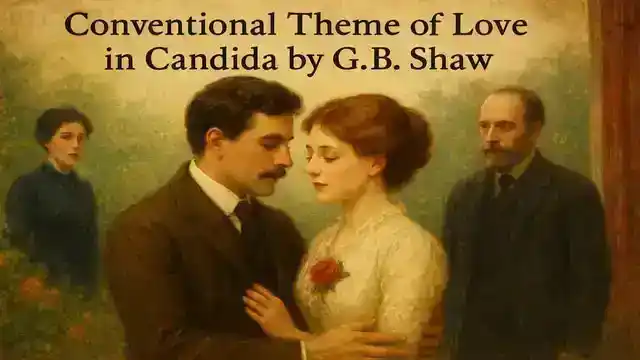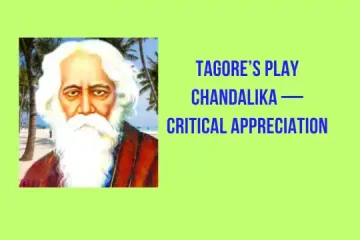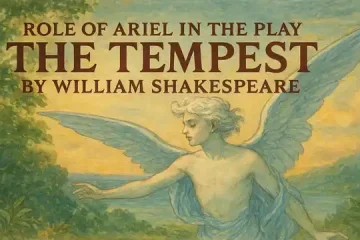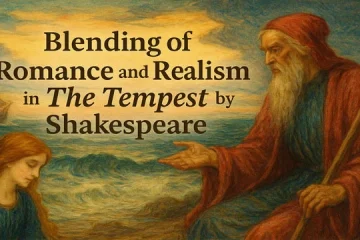Conventional Theme of Love:
The story of this play “Candida” is based on conventional theme of love. It is generally called the eternal triangle. According to it, two persons fall in love with a lady. Among her lovers one is her husband and other is her boyfriend. Candida, the wife of James Morell, a clergyman of the Church of England, is loved with her that he usually talks about her. The conjugal relations of a clergyman with his wife form the entire contents of the play. The stranger called Marchbanks is introduced. He declares that he is in love with the clergyman’s wife. The play, thus mounts to its climax in extra ordinary emotional tensions. Here the ‘eternal triangle’ of love is complete.
Candida’s Being Inclined to Her Husband due to Her Devotion and Loyalty to Him:
Candida, as embodiment of faithfulness, loyalty and dedication is completely devoted to her husband. She looks after him like a sincere wife. She is very well aware of her responsibility in supporting her husband. In the last scene she tells her lover Eugene how she has been playing the role of a mother, sister and wife in the life of James since her marriage. She makes Morell realise this fact as Morell says to her:
“What I am you have made me with the labor of your hands and the love of our heart. You are my wife, my mother, my sister: you are the sum of all loving care to me.”
When she is asked to choose either between her husband or her lover, she favours her husband and argues that her husband is weaker than her lover and he cannot lead his life without her. In this way both Candida and Morell have devotion for each other.
Marchbanks, Too a Sincere Lover Belonging to a World of Poetic Fancy:
Eugene Marchbanks is also a sincere lover of Candida and lives in another world with the love of his beloved. Due to having poetic nature and poetic fancy, he has belief in the world of emotions. That is why he does not hesitate to accept in respect to Morell that he is madly in love with Candida. He is a boy of eighteen years aged woman of thirty is very frank and intelligent. He tells Morell how Candida, too, loves him and Morell is despised by her. This carries a dispute between him and Morell. In order to present the nature of his love he uses metaphors. He says to her:
“Nothing but to repeat your name a thousand times, do you not feel that every time is a prayer to you?”
When he is asked to tell something about Candida, his voice deepens to a measured and mournful tenderness and he says:
“I have nothing to tell her, except that she is my greatest treasure if she is really mine.”
Candida’s Anti – romantic and Intellect Attitude:
Candida knows very well that Eugene is madly in love with her. Though poetical qualities in Eugene’s character make her think of him, she does not have the similar feelings of love for him. Her outlook is not only based on anti – romantic attitude but also on intellect. She tells Morell:
“Do you know James, that though he has not the least suspicion of it himself? he is ready to fall madly in love with me ? ”
She also tells him:
“Eugene is always right. He is a wonderful boy. I have grown fonder and fonder of him all the time, I was away.”
She understands well that when he is grown up and experienced like James, he will realise what James and Candida have realised. She further tells Eugene that his thoughts will depend “on how he comes to know what love really is, I mean on the sort of woman who will teach it to him.”
She explains her notions and says:
“If Eugene learns it from a good woman, then it will be all right, he will forgive me.”
Candida’s Sympathetic Outlook towards Eugene:
Candida’s outlook towards Eugene is sympathetic as she confesses:
“I will give them both to poor Eugene as willingly as I would give my shawl to a beggar during cold, if there were nothing else to restrain me.”
In this way she neither belongs to James, nor to Eugene. But her treatment is very sympathetic to both of them and her decision that she will choose the weaker of the two, reveals this fact while declaring that she is going to be Morell’s, she does not ill – treat Eugene and tries to teach him the facts of life.
Shaw’s Treating the Common Place Triangle in Entirely New and Original Way Candida is not only a faithful wife , she is also the strongest character in the play, and is guided by commonsense not by emotion or passion. Instead of accepting the old theatrical role of a woman who allows herself to be quarrelled over by two men and passively disposed of to either the one or the other. Candida takes the situation under her own control brings their dispute to an immediate end and imposes her own will upon both men. In Act III when asked by Morell to make her choice she sarcastically addresses them as her lords and masters and asks them what they are going to offer for her.
Morell declares:
“I have nothing to offer you but my strength for your defence, my honesty for your surety my ability and position for your livelihood and my authority and position for your dignity.”
Instead of offering protection to Candida, Marchbanks wants her protection for himself. He says:
“My weakness. My desolation. My heart’s need. ”
Candida thinks over the two offers. Then she says:
“I give myself to the weaker of the two.”
Marchbanks understands that her choice has fallen on Morell, whose life will become miserable without her. Morell thinks that she has chosen Marchbanks because he is physically weaker. Morell’s self – confidence is shattered and the fear of losing Candida makes him cry out:
“What I am you have made me with the labor of your hands and the love of our heart. You are my wife, my mother, my sister: you are the sum of all loving care to me.”
Marchbanks’ Love for Candida, Devoid of All Facts and Reality:
Marchbanks’ expression of love is excessive and is devoid of all fact and reality. The thought that Candida has to rub and clean the floor with the brush fills Marchbanks with horror and he gives out a painful cry. When she asks him to present her a scrubbing brush with an ivory back set with mother – of – pearl, at once he bursts in poetic effusions and expresses his longing for pure and perfect love:
“No, not a scrubbing brush, but a boat: a tiny shallop to sail away in, far from the world, where the marble floors are washed by the rain and dried by the sun; where the south wind dusts the beautiful green and purple carpets. Or a chariot! to carry us up into the sky, where the lamps are starts, and dont need to be filled with paraffin oil every day.”
Furthermore, when Eugene tells Candida that her feet would be beautiful on the mountains, she retorts that her feet would not be beautiful on the Hackney Road without shoes. The romantic illusions of Eugene Marchbanks are shattered and this is one of the main themes of the play. Next there is also another romantic illusion of Marchbanks. He thinks that Candida hates her husband. Morell and if she is asked to choose either of them, she is certain to choose him, but he is profoundly shocked and his illusion is shattered when she declares her inclination to her husband .
Shaw’s Puncturing Morell’s Illusions with Regard to Religion and Socialism:
Morell thinks that people come to him because they are fascinated by religious zeal. He is striving to bring the Kingdom of Heaven on earth, but Candida takes out him from the deep bog of illusions by saying that the people show their approval, with his view, but they do just opposite of what he says. On Sundays people come to the parsonage only to be refreshed by hearing him preach. This helps them to work harder and to earn more money. Men love to hear him. Women like to look at him. The people are merely excited or made drunk by his fine eloquence but they are not changed or made more religious. Candida says:
“People do not come to parsonage to hear the gospel. They come because they are in love with his fine manner of preaching. Morell does not preach to propagate the gospel. He preaches because he gets an opportunity of addressing people in his excellent manner of preaching.”
Eugene’s Having Illusion about His Morally and Intellectually Superiority:
Eugene Marchbanks rears an illusion in his mind that he is superior to Morell in moral and intellectual way. In fact Morell, in his opinion, may be stronger physically. Marchbanks’ words are in fact thunderbolt, causing cracks in the shell of his dominance and superiority. He says:
“I am not afraid of a clergyman’s ideas. I’ll fight your ideas. I’ll rescue her from her slavery to them. I’ll put my own ideas against them.”
Eugene mutilates Morell’s confidence in himself. Ultimately he accepts his weakness in the auction scene where he confesses that she is his wife, his mother, his sisters and he has no entity of his own without her.
Thus, it can be clearly be observed that traditionally, the wife has been responsible to desert the husband and go out with the lover, but in Candida, she chooses to stay on and the lover has to go out without his beloved. In the play, the wife has been faithful, loyal and devoted to her husband upto the very end. There is no sex intrigue. The purity of the home is maintained, and the marriage is not broken up as is the case with the conventional treatment of the eternal love triangle. The husband’s illusion regarding his strength and his role are shattered, he comes out of the encounter a sadden and wiser man, and the two — the husband and the wife— are left alone together to work out their own salvation. The motive of the play is as clear as daylight. It is an attack on the hollow, meaningless and, worn – out conventions of society. Marchbanks and Morell are Shaw’s mouthpieces. Such qualities as honesty, virtue are abstract notions with which society, is not concerned. Shaw aims at purging the society of all these senseless conceptions. Shaw prefers double role at the same time – as the iconoclast and the reformer.




